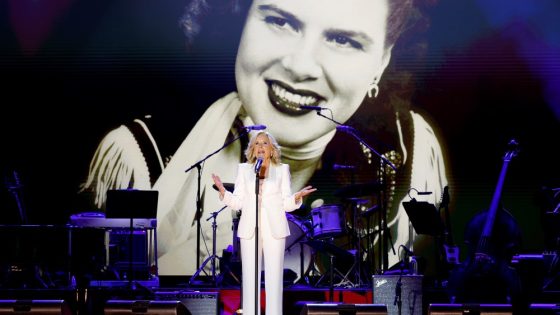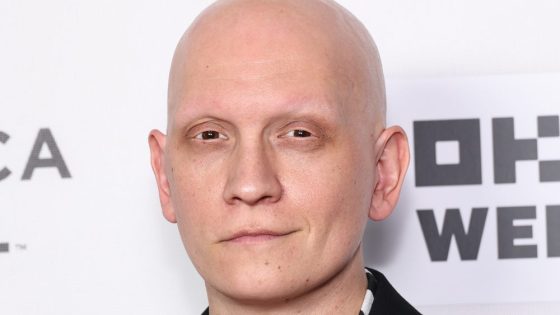There used to be a joke in old-school country music: How many girl singers does it take to sing Patsy Cline’s “Crazy”?
The punchline was always an eye-rolling “All of them.” It spoke to the ubiquity of Cline’s influence, as well as the tired renditions of Willie Nelson’s torch lament every “chick singer” clung to.
Back in those pre-internet days, Cline’s ubiquity was word-of-mouth, but deeply felt. Anyone who heard her velve-and-molasses swelter was drawn to its passion, pain, occasional joy and often unrequited desire. A throbbing cocktail of hanging on in spite of all evidence, she bewitched generations. Yet, somehow, her omnipresence faded into a few facts, a couple songs mostly disconnected from their essence and a name dropped as a hollow echo by the hoi polloi.
“Walkin’ After Midnight: The Music of Patsy Cline,” a concert held at Nashville’s Ryman Auditorium Monday that will air on PBS later this year, was designed as a living, breathing testament to the vulnerability and big emotions of the country chanteuse whose sophistication matched her swagger. Cline’s musical influence was on display with a lineup that included, among others, First Lady Jill Biden, country stars Wynonna Judd, Mickey Guyton and Ashley McBryde, rockers Pat Benatar and Grace Potter, ‘70s icon Crystal Gayle, rising Americana star Jaime Wyatt, Tony winner Kristen Chenoweth, emerging country forces Hailey Whitters and Reyna Roberts, actress Rita Wilson and Christian music legend Natalie Grant.
First Lady Dr. Jill Biden speaks onstage during Walkin’ After Midnight: The Music Of Patsy Cline at Ryman Auditorium on April 22, 2024 in Nashville, Tennessee.
Getty Images
Biden’s opening remarks gave the evening gravitas. Invoking the way music dissolves differences, Biden explained, “Her music gives voice to the feelings we can’t always define, tracing the contours of our joys and sorrows. It reminds us we aren’t alone … Here in America, our differences are precious and our similarities are infinite. And when those familiar harmonies swell, the distances between us shrink, the barriers fall away, and we find ourselves singing along with strangers and friends alike.”
With the band seated – led by musical director Cactus Moser, featuring pedal steel legend Russ Pahl – Guyton proudly walked onstage. Smiling, she announced over the introduction, “As a woman in 2024, I’m not walking after midnight for nobody, and I mean nobody.” She then delivered a swinging take on the evening’s title song. If the Texas-born Black woman is the likely heir apparent to Carrie Underwood’s legacy, she understood collecting for those final lines and really delivering on Cline’s power.

Mickey Guyton performs onstage during Walkin’ After Midnight: The Music Of Patsy Cline at Ryman Auditorium on April 22, 2024 in Nashville, Tennessee.
Getty Images
As an opening performance, it broke all expectations of what country should be — and reminded people that Cline’s countrypolitan stylings were as much cocktail jazz as massive emotions laid bare. Those massive emotions marked the night, displaying the lingua franca of a genre built for working class adults.
Blue-collar ethos grounds McBryde, who bathed “Leavin’ On Your Mind” with stoic resignation that showed the mettle to face what’s going on. Having to follow Wynonna, the queen of country soul, on the delicious agony of “Sweet Dreams,” McBryde’s raw tenor offered the splintered conviction of pride against the Country Music Hall of Famer’s cavernous pool of tender yearning.

Ashley McBryde performs onstage during Walkin’ After Midnight: The Music Of Patsy Cline at Ryman Auditorium on April 22, 2024 in Nashville, Tennessee.
Getty Images
Those juxtapositions occurred throughout the three-hour celebration. Two women who played Cline — Beverly D’Angelo from the film “Coal Miner’s Daughter,” and Mandy Barnett, who did it on the Ryman stage for years with the long-running stage production “Always, Patsy” — offered the guts and gusto of the at times bawdy entertainer. D’Angelo talked of being 27, in a role that changed her life, then delivered a zesty turn on the wry “Too Many Secrets,” stopping the band to regroup for the final section. Barnett, who played the role as a teenager, applied her velvety alto to the disappointment of “Why Can’t He Be You” with the nuance of knowing it’s good, but not what you need.

Mandy Barnett performs onstage during Walkin’ After Midnight: The Music Of Patsy Cline at Ryman Auditorium on April 22, 2024 in Nashville, Tennessee.
Getty Images
Cline, the uber-Everywoman, owned all the messy emotions. For anyone going through anything, her songs were an emotional compass to not feel so alone as you navigated your way back to whole.
Performances were offset with video clips of her peers. Seeing long-deceased Country Music Hall of Fame inductees Harlan Howard, Ferlin Huskey, Roy Clark, producer Owen Bradley, Dottie West and Loretta Lynn talking about their friend, her songs, ethics, talent and approach to life added dimension to Cline’s humanity. Mel Tillis appeared briefly, talking about a song he’d had a hand in writing, explaining, “not only could she sing the songs, she could pick the hits.”
As the steel-drenched “So Wrong” began, Pam Tillis, the 1994 Country Music Association Female Vocalist of the Year, emerged in black, gold and bronze sequins to a standing ovation. As she found the space between regret and devastation, opening up on the bridge and final choruses; it was those final notes where Tillis’ gifts shone.
Honoring forebears beyond Cline was a subtext. Like Tillis following her father, International Bluegrass Music Association Entertainers of the Year Dailey & Vincent paid homage with Bill Monroe’s “Blue Moon of Kentucky.” The Jordanaires were celebrated by five-voice a cappella group Home Free; they delivered a swing “Seven Days,” while the Isaacs recreated their lush harmonies throughout the evening.
Benatar was on the other end of the spectrum. She declared “We’re glad to be here to celebrate the original bad ass,” as she and Neil Giraldo gave “Imagine That” a definite stomp. With a taste for vintage pop, the Rock and Roll Hall of Fame inductees delivered the lamenting irony with a richness that belied the aching.

Grace Potter performs onstage during Walkin’ After Midnight: The Music Of Patsy Cline at Ryman Auditorium on April 22, 2024 in Nashville, Tennessee.
Getty Images
Grace Potter, dressed in metallic red leather bolero and miniskirt, hippie-danced onstage and inquired, “Are you ready to get strange with me?” A Western-leaning tumbleweed of a song with a vocal that surges up and recedes, “Strange” philosophically acknowledges not being able to let go of a love that’s long gone – and Potter delivered with a wink.
The night’s surprise was Tami Neilson, whose bravura “Three Cigarettes in an Ashtray” was a molten pool of watching the end go down. In a form-fitting black cocktail dress covered with sequined third eye appliques and a net mermaid flounce from the knees to the floor and a jet-black, high-rise bouffant, her reserve crumbled into a massive wave of emotion that even dwarfed her sartorial drama.
That drama, properly contained, made Cline an artist whose songs connected long after the burgeoning superstar died in a plane crash at the age of 30. Brash, worldly and consumed by songs, the West Virginian who could bring a song to its knees forged a modern country style that was as home at Carnegie Hall and the Hollywood Bowl as it was during her myriad appearances at the Grand Ole Opry.
With her daughter Julie in attendance, showing the diversity of Cline’s impact was a priority for the producers. Keeping the music true to Owen Bradley’s original recordings, the performances transcended the idea of time. Regardless of the decade, her suffering heart and caressing vocals united artists unafraid of the rawest emotions.
As for “Crazy,” it only took one woman to get the job done. Wynonna returned for the night’s final song, exhaling the anguish and absolving herself of the self-recriminations that loving someone who will never do you right incurs. A prodigious vocalist who has lived life with the same wide open embrace, her performance suggested a loving acceptance of the status quo that was neither tormented nor defeated by grief.

Wynonna performs onstage during Walkin’ After Midnight: The Music Of Patsy Cline at Ryman Auditorium on April 22, 2024 in Nashville, Tennessee.
Getty Images
Whether social media stars understand the palpable misery of real life gone wrong, romances falling apart, or those moments of rare euphoria, Cline’s example has seeped into the culture. Rockers, grassers, new country stars, legends and even actresses draw on her unabashed style and song sense. That ardor elevated “Walkin’ After Midnight” from a cattle call of girl singers to a girl-power diversity rally that sounded heavenly in spite of the songs’ often implicit torture and pain.

Reyna Roberts performs onstage during Walkin’ After Midnight: The Music Of Patsy Cline at Ryman Auditorium on April 22, 2024 in Nashville, Tennessee.
Getty Images
Source Agencies


